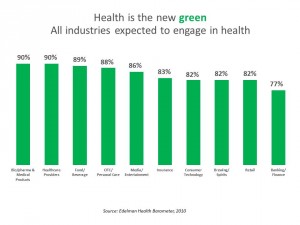The 87th annual 2015 Oscars show (#Oscars15) feted more than the movie industry: the event celebrated health in both explicit and subtle ways.
Julianne Moore took the golden statuette for Best Actress, playing the title role in Still Alice, the story a woman diagnosed with early-onset Alzheimer’s Disease. In accepting her award, Moore spoke of the need to recognize and “see” people with Alzheimer’s – so many people feel isolated and marginalized, Moore explained. Movies help us feel seen and not alone – and people with Alzheimer’s need to be seen so we can find a cure, she asserted. See Moore’s lovely remarks here:
Eddie Redmayne took Oscar home for his portrayal of Stephen Hawking in The Theory of Everything. In the role, Redmayne channels Hawking through his journey from young, healthy Cambridge University student through decades of living with ALS. Redmayne tells us in his thank-you here how his Oscar statue belongs to everyone battling ALS, and he will be Oscar’s custodian on their behalf:
Graham Moore won as writer for Best Screenplay for The Imitation Game. He confessed that when he was younger, he tried to commit suicide. But, Moore pleaded: “Stay weird, stay different, and when it is your turn and you are standing on the stage,” pass on the message that it gets better. See Graham’s message, bolstering self-acceptance and positive mental health, here:
Financial wellness came to the 2015 Oscars as well, in the form of Patricia Arquette, named Best Supporting Actress for her role as the mom in Boyhood who, over the course of 12 years, lives the arc of mothering and shepherding a son from little boy to young adult. Her health message in her speech: equal pay and equal rights for women. Underneath the gender inequality of income are health disparities, which I talked about in these Huffington Post columns: Chief Health Officers, Women, Are In Pain and Even Rich Girls Worry About Being Bag Ladies. Listen to Arquette’s speech, which went viral fast on Twitter, and drove women in the audience to their feet (with Meryl Streep’s standing ‘o’ featured in this video):
The song Glory, written by Lonnie Lynn (aka Common) and John Stephens (aka John Legend) for the movie Selma, won the Oscar for Best Song. In the lyrics, Glory recounts Martin Luther King, Jr.’s, fight for civil rights — which speaks to me of health equity. Listen to this amazing song, performed by the song’s writers, here:
And finally, to celebrate the 50th anniversary of The Sound of Music, Lady Gaga delivered a musical medley with accompanying string orchestra that moved Julie Andrews and the audience. There’s evidence that singing bolsters health and memory. And probably happiness, as the Twitter feed went wild for @LadyGaga during and after the performance:

Health Populi’s Hot Points: Most consumers expect the entertainment industry to engage in health, we learned in the Edelman Health Barometer’s 2010 survey of global consumers. The chart illustrates some of the obvious — that the vast majority of people look to engage in health with life science, hospitals, food and beverage, and over-the-counter drug companies. But check out the industries to the right of the “health care” sector: nearly as many consumers (86%) expect to engage in health with media and entertainment companies as with OTC medicine manufacturers (88%).
This year’s Oscar award winners demonstrate that the entertainment industry is reflecting consumers’ demand for health, everywhere — where we live, work, play, learn, and even when we go to the cinema.




 Thank you, Jared Johnson, for including me on the list of the
Thank you, Jared Johnson, for including me on the list of the  I am so grateful to Tom Lawry for asking me to pen the foreword for his book, Health Care Nation,
I am so grateful to Tom Lawry for asking me to pen the foreword for his book, Health Care Nation,  Thanks to Feedspot for naming this blog, Health Populi, as a
Thanks to Feedspot for naming this blog, Health Populi, as a